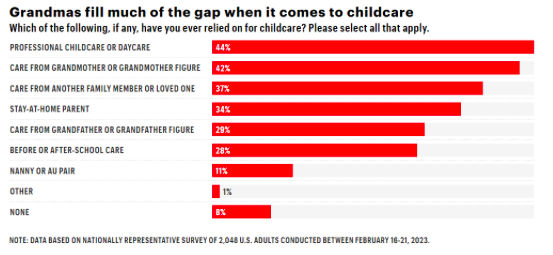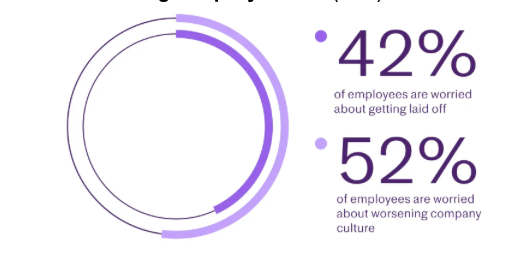Brief • 4 min Read
The latest trends in culture and society from The Harris Poll
As Americans eye the news around the banking chaos, our America This Week tracker, fielded March 10th to 12th among 1,973 U.S. adults, continues to find sustained fears around the economy and inflation (85%, +1%-pt from last week), a potential U.S recession (80%, -1%-pt), and ability to afford one’s living expenses (70%, +2%-pts). (Note: we were in the field over the weekend when SVB was imploding)
Here’s what else you need to know this week:
- In the first-ever State of Women report with theSkimm, American women are eager to live by their rules – not society’s.
- And speaking of women, grandmas are the economic backbone keeping many employed Americans working.
- Then while a recession looms, the potential impacts on company culture weigh heavily – even more than possible layoffs.
- Finally, we detail how American patients notice the labor shortages impacting healthcare.
These stories are below. And check out the America This Week monthly summary slide deck and tabs. Download the February report here.
Women Are Done Letting Society Dictate Their Role: The Skimm-Harris Poll
In the new 2023 State of Women report in partnership with theSkimm and featured in Forbes, we found that while women are exhausted and disappointed, they have not given up on themselves – just the illusion of external support. Instead, the findings show that women are making seismic changes to their lives, finally prioritizing their needs and exhibiting agency and a willingness to make tough choices to secure their futures.
Society Is Not Working For Women Right Now
- Tired of unreciprocated contributions: Nearly 9 in 10 women (86%) agree that women contribute more to society than they get back.
- And the unbearable mental load: Over 7 in 10 women (71%) said it’s their job to be the Chief Worry Officer (CWO) as they are tasked, explicitly and implicitly, with the mental load at home and at work of thinking through every scenario, and planning for every contingency.
- Zero-support structure: 4 in 5 women (82%) said that while there’s much talk about overburdened women, no one is helping them ease the burden.
So, Women Are Rewriting The Next Chapter
- Taking control of their lives: 9 in 10 millennial women (89%) are actively seeking ways to build the lives they want.
- Move over society, women are deciding now: 4 in 5 (83%) women agree that they are done letting society dictate a woman’s role.
- And two-thirds (64%) feel the trajectory of their lives is more determined by their goals and actions rather than societal factors (36%).
Grandmas Are The Unsung Heroes of the American Economy: Fortune-Harris Poll
In our latest survey with Fortune, we find that with many Americans struggling to find affordable childcare, grandmothers serve as critical support to their families and the broader economy. Without this typically unpaid – or underpaid – help, many more working parents would be forced to make difficult choices about returning from their professional lives to care for their children.
- Calling on grandma: Over 2 in 5 (42%) of working parents rely on grandmothers for childcare, at a similar number of those utilizing professional childcare/daycare:

- The vast majority (92%) of Americans believe grandmas are making significant economic contributions through the childcare they provide, with over 4 in 5 (83%) even saying that without this care, the American economy would suffer.
- Grandmas are career savers: About 4 in 5 working parents who rely on grandmas for childcare say that support allows them to pursue their career goals, and two-thirds (67%) say there are times they might have lost their job without the help of their child’s grandmother stepping in to help with care.
Takeaway: “Since the onset of the pandemic, many advocates, politicians, and parents have pointed out that the childcare crisis is an economic problem, as well as a personal challenge facing many American families. Without stable, high-quality childcare, parents cannot maximize their productivity at work. As a result, children are a result; children are not getting the foundation they need to succeed. Overall, the lack of adequate childcare for infants and young children across the country is now estimated to cost the U.S. $122 billion annually in lost earnings, productivity, and revenue” (Fortune).
As A Recession Looms, Employees Fear Company Culture Changes: Justworks-Harris Poll
According to our latest research in partnership with Justworks, as featured in Forbes, many employed adults are changing their work habits as they determine how to prepare and move forward during these uncertain economic times.
- Even while over 2 in 5 employees (42%) are worried about getting laid off due to the looming recession, more employees are worried about a worsening company culture (52%):

- Doubling down to prove their value: Nearly half of the employees (47%) say they have changed their behavior at work to avoid being laid off during the looming recession, such as working longer hours (35%).
- Others feel that increasing their skillset will provide them with more job security, with just under one in five saying they’ve learned new professional skills (19%) and considered additional schooling (17%).
- Work might not be such a great place to be as nearly half (46%) say that their coworkers are more competitive at work now than before the looming recession, and a similar number (48%) say they are worried about a reduction in offered benefits or perks at their company.
Takeaway: With all the surrounding uncertainty, it’s logical that many American workers are getting their affairs in order, with around a quarter being resigned to the job search and taking steps such as updating their resume (28%) or actively applying to jobs (24%). However, their outlook is gloomy, with half of the American workers (50%) feeling they have fewer job opportunities available to them today.
Understaffing Woes at the Dr.’s Office: HealthDay-Harris Poll
The latest survey in collaboration with HealthDay, as featured in U.S. News & World Report, finds a growing number of Americans are feeling the effects of the healthcare staffing crisis in the United States.
- More than a third (35%) of people noticed or had been affected by healthcare staffing shortages at the time of the February poll, up from (25%) last November.
- Quite concerningly, the data reveals an even more pronounced impact on women, who are more likely than men to have experienced shortages in health care (41% v. 28%).
- These shortages have hampered people’s ability to receive medical care: More than 4 out of 5 Americans (84%) have tried to get health care in the past six months, and of those, nearly 3 in 4 (73%) experienced delays or challenges in getting the care they need.
- Further, more than half (52%) reported that they’re worried they won’t be able to get needed medical care because of staffing shortages.
Takeaway: Experts say that U.S. healthcare has been experiencing workforce issues for some time now, but the pandemic exposed and worsened those issues. “We’ve had a healthcare workforce crisis in this country for a long time. It pre-dated COVID,” said Sophia Tripoli, director of the Center for Affordable Whole Person Care for Families USA, a nonprofit health consumer advocacy group. “But I think the pandemic public health emergency has amplified all of the shortages and the staffing issues,” Tripoli said. “It’s been a tough time for the healthcare workforce on the front lines of the greatest public health emergency we’ve faced in about 100 years” (U.S. News & Global Report).
Subscribe for more Insights
Subscribe to our newsletter for the latest trends in business, politics, culture, and more.
Download the Data
This survey was conducted online within the U.S. by The Harris Poll from March 10th to 12th, among a nationally representative sample of 1,973 U.S. adults.
Download
Subscribe for more Insights
Subscribe to our newsletter for the latest trends in business, politics, culture, and more.
Download the Data
This survey was conducted online within the U.S. by The Harris Poll from March 10th to 12th, among a nationally representative sample of 1,973 U.S. adults.
DownloadRelated Content








